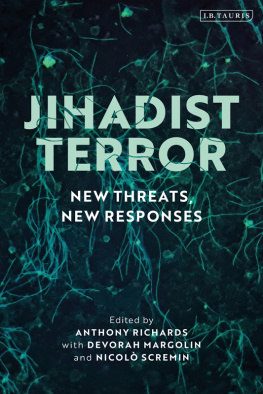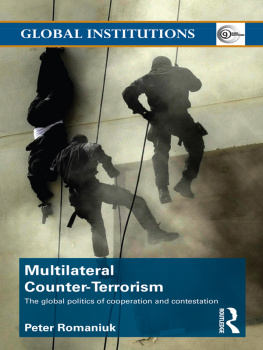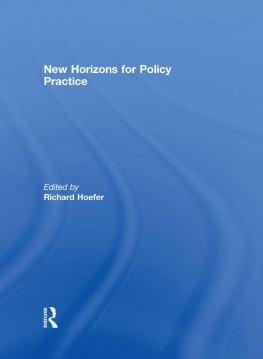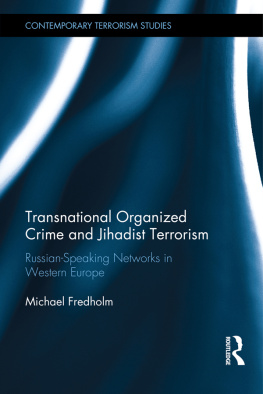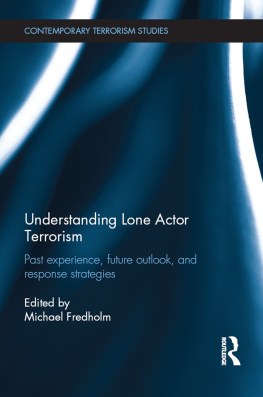JIHADIST TERROR
JIHADIST TERROR
New Threats, New Responses
Edited by
Anthony Richards
with Devorah Margolin
and Nicol Scremin

COMBATING JIHADIST TERRORISM AND EXTREMISM (COJIT)
In light of the London Bridge attack on 3 June 2017, the third of five jihadist-inspired terrorist assaults in the UK that year, concerned citizens across the country were asking three questions: why is this happening? Is there a solution? And if so, what is it?
The prime minister said we had shown too much tolerance of extremism in the UK and that we must be prepared to have difficult and embarrassing conversations throughout our society to combat the influence of the nihilistic hatred that jihadist terrorism represents. Such conversations must involve all sectors of UK society, not just within and between minority segments.
CoJiT is an initiative designed to make a rapid, direct and high-profile contribution in responding to these difficult questions and to play a catalysing role in the national conversation called for by the prime minister. It has brought together leading experts to look afresh at how we define the particular problem of jihadist terrorism and to discuss openly what has to be done to counter it and the extremist ideology that fuels it, not just in the UK but around the world. The initiative is focused on the active encouragement of practical policy engagement at all levels designed to affect both policy and operational change.
CoJiT will promote this engagement through an independent national dialogue with community individuals, local government and social and police leads, as well as with national government. It will focus on practical solutions identified by the initiative, such as CoJiTs recommendation for independent oversight of the governments Prevent programme, encouraging where possible their adoption and implementation.
CoJiT is conceived quite independently and begins with a problem-solving perspective: it is not our intention to duplicate any of the extensive and good analysis already in existence, but rather to offer an independent synthesis of it as a baseline of accepted evidence to initiate the sort of honest national dialogue the prime minister has called for.
The CoJiT-funded conference on Combating Jihadist Terrorism in the United Kingdom, held at the Royal Institution, London, in September 2018 under the Chairmanship of former RUSI Director, Professor Michael Clarke, of which this book is the product, was the first iteration of the independent national conversation that CoJiT is seeking to promote. CoJiTs objectives in light of the outcomes of that first conference are to:
Promote an active, sustained national conversation primarily in the UK about jihadist terrorism and related extremism
Develop further the body of analytical work contained in this first publication, summarizing the emerging conclusions with public presentations
Support, contribute to and collaborate with other organizations involved in related endeavours
We hope you find much of value in the contributions in this volume and that you will wish to take an active part in the independent national conversation on combating terrorism and extremism in the months and years to come.
Ian Maxwell & Mohamed Amersi
CoJiT Founding Members & Directors
www.cojit.org
Anthony Richards
F rom March to September 2017 the UK endured a series of terrorist attacks on its mainland that killed thirty-six people and injured hundreds more. It was against the backdrop of these events that saw the formation of Combating Jihadist Terrorism in the UK (CoJiT-UK), an independent initiative designed to promote a national conversation on the causes of jihadist terrorism and what the most appropriate responses might be. Reconstituted in December 2018 and renamed Combating Jihadist Terrorism and Extremism (CoJiT), the project consists of two phases Phase 1 has entailed bringing together leading national and international experts for their valuable contributions in understanding particular aspects of the phenomenon and their thoughts on potential responses. It is this first phase that culminated in a major conference in London in September 2018 and the publication of this edited volume. Phase 2 of the project aims to i) focus on the themes that have emerged from Phase 1 that have been identified as requiring further exploration and ii) generate a national conversation around the causes of, and responses to, jihadist terrorism.
Two elements in particular mark the CoJiT project and this book as distinctive: i) the project, from which this book has emerged, is independent and independently funded and therefore owes nothing to political sensitivities, institutional competition or preconceived ideas; and ii) the following contributions, rather than sharing new research, have adopted a synthesis approach in assessing the available evidence-based research to date. They are intended to determine, for each topic area, what we know, what we dont know and what we need to know in relation to terrorism carried out by those claiming to be acting on behalf of Islam.
The UK has sadly been no stranger to the threat of terrorism. It seems remarkable that, in fact, the country has been confronted by an almost uninterrupted threat from terrorism for the past fifty years beginning with the outbreak of the Troubles in Northern Ireland in the late 1960s, to the persistence of the dissident republican threat after the signing of the Good Friday Agreement in 1998, to the emergence of the Al-Qaeda threat, to the more subsequent threat posed by ISISrights, to right-wing terrorism, and not to overlook the Welsh Meibion Glyndwr (Sons of Glyndwr) group and the rather obscure Scottish National Liberation Army. Indeed, the British experience of fifty years of terrorism demonstrates an insoluble fact that no particular ideology or ideologies can claim ownership of terrorism. Terrorism is a method that has been used in pursuit of a range of different belief systems, whether or not those doctrines are themselves violent. It has been employed in the cause of the violent dogmas of Al-Qaeda and ISIS, just as it has been adopted as a method by those whose ideologies may not be inherently violent (such as nationalism, animal rights or anti-abortion).
Terrorism, in different forms, continues to feature prominently in the threat landscape that faces the UK. The dissident republican threat persists in Northern Ireland and right-wing terrorism has emerged as an increasingly serious problem the latter was responsible for the murder of MP Jo Cox in June 2016 and for the Finsbury Park van attack last year. Right-wing extremism, more broadly, and its divisive and polarizing effects on communities represent a major challenge in the years ahead. Finally, it is clear that jihadist terrorism continues to present a formidable threat.
It is the latter that this book focuses on terrorism claimed to be carried out on behalf of Islam. This is not to imply that the other terrorisms noted above are unimportant clearly they are nor that right-wing terrorism, in particular, is not part of the general context of the problem. Jihadist terrorism, however, has not only hitherto represented the most significant terrorist threat to the UK but it also has its own set of motivations that makes it worthy of study in its own right.
The international threat of Al-Qaeda emerged in the 1990s, perhaps most evidently through the US Embassy bombings in Kenya and Tanzania of 1998 that killed over 200 people and injured many more. After the devastating attacks on 11 September 2001 and a series of subsequent Al-Qaeda attacks, including the Madrid train bombings of 11 March 2004, it seemed inevitable that a plot against the UK homeland from this new form of terrorism would succeed as the security agencies had warned. This threat did indeed materialize through the London transport bombings of 7 July 2005 when fifty-two people lost their lives. Ever since, the terrorist threat from those who have claimed to be acting on behalf of Islam has not only persisted in the UK but has also significantly increased. In November 2007 Jonathan Evans, the then Director General of MI5 (and now Lord Evans of Weardale), warned that the number of people involved in terrorist related activity had increased to 2,000 and that he suspected that there were at least a further 2,000 that they were unaware of. These were staggering figures and many were perplexed, with some justification, as to how it was that the UK found itself in this position.
Next page
